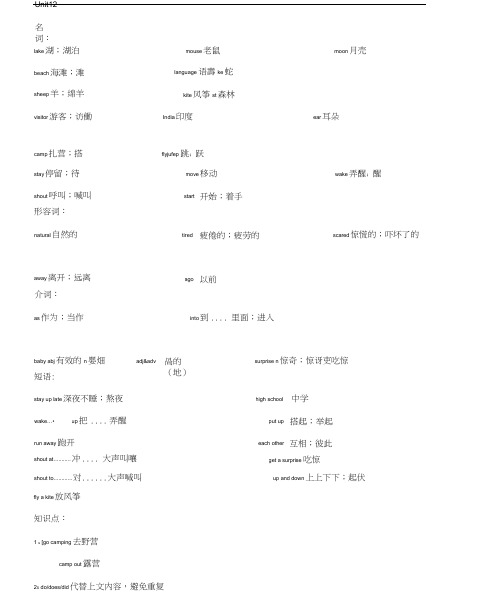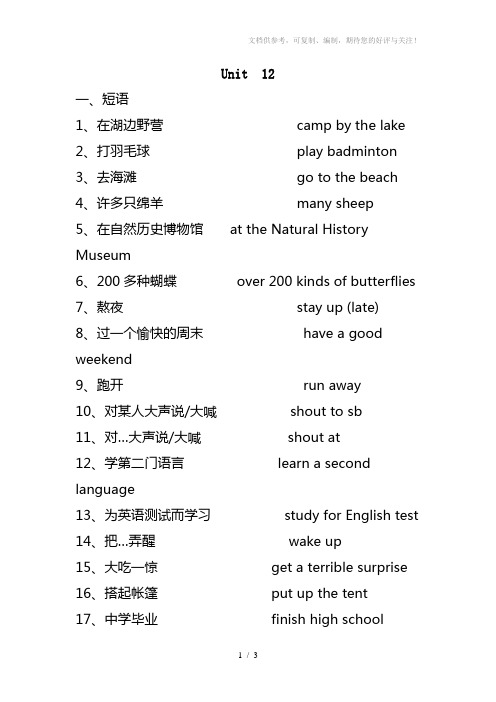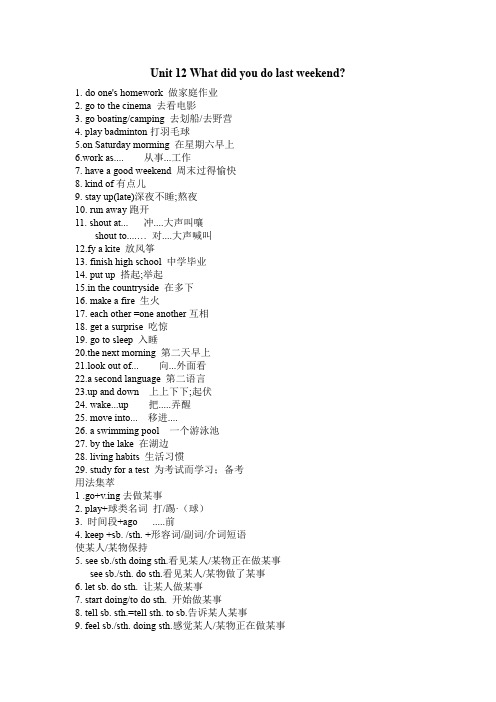七年级人教版英语下册第12课知识点复习
人教版七年级下册英语Unit12知识点

language 语壽ke 蛇kite 风筝st 森林camp 扎营;搭 flyjufep 跳;跃形容词:介词:into 到 .... 里面;进入短语:shout at ........... 冲 .... 大声叫嚷 shout to ............ 对 ...... 大声喊叫up and down 上上下下;起伏fly a kite 放风筝知识点:1 s [go camping 去野营camp out 露营2S do/does/did 代替上文内容,避免重复Unit12 名词:lake 湖;湖泊 mouse 老鼠 moon 月売visitor 游客;访働 India 印度 ear 耳朵 stay 停留;待 move 移动 wake 弄醒;醒shout 呼叫;喊叫 start 开始;着手natural 自然的 tired 疲倦的;疲劳的 scared 惊慌的;吓坏了的away 离开;远离 ago 以前baby abj 有效的n 婴畑 adj&adv 咼的(地)surprise n 惊奇;惊讶吏吃惊 stay up late 深夜不睡;熬夜 high school 中学wake …• up 把 .... 弄醒 put up 搭起;举起 run away 跑开 each other 互相;彼此 beach 海滩;滩 sheep 羊;绵羊 as 作为;当作 get a surprise 吃惊Who visit her grandma ?谁看望了她的奶奶?—Betty did. Betty 看望了。
Who break the window ?谁打破了窗户?一Tim does. Tom 打破的。
do/does/did 取决于问句中的慰3、as +名词作为 .........As a player, you should have a strong body.作为一名运动员,你应该有一个麓 She worked as a teacher in this school.她曾在学校里当过老师 4Hc (w happy they look !他们看起来多么高兴啊! bow hard he is working !他工作地多么努力啊!h第2)what 引导的感闵| What + a/an +形容词+可数名词单数(+主语谓语!多么……啊! ^jat a clever boy ( he is ) !他是多么聪明的一个小男孩啊! @ What +形容词+可数名词复数(+主语谓语! 多么……啊!She is tired of this excuse.她厌烦了 这个借She is tired of playing the violin. 她厌烦 了 拉小提琴 6、 shout out 大声说shout at 冲 .... 大喊,生气愤怒She s^out out for help. 她大声呼救 oDavid is angry and he shouts at Tim. David 很生气,冲着 Tim 大喊。
初一下册英语知识点汇总:Unit12

初一下册英语知识点汇总:Unit12初一下册英语知识点汇总:Unit12学习目标:1谈论规则2祈使语气3表示允许4能够用口头或书面描述规则重点和难点:重点掌握祈使语气的用法,包括表示允许的an及其当情态动词用的have t d;以及各种可以用在表述规制度的动词和句型。
难点在于情态动词的用法,以及祈使句与它的应答。
1表示规则的句型:--- Dn’t run in the hallas--- Srr, s endzaDn’t ath TV after shlDn’t g ut n shl nights1思考、谈论规则。
Dn’t tal ludlD ur her after shl!Pratie ur guitar ever da引导、启发、教授需学内容。
2an fr perissin, suh as: e an d…e an’t d…an e d…?--- hat are the rules?--- ell, e an’t arrive late fr lass--- an e listen t usi, Alex?--- e an’t listen t usi in the hallas, but e an listen t it utside 后复习资料一、短语1in lass 在上2n shl nights 在上学的晚上3shl rules 校规4n taling 禁止交谈listen t usi 听音乐6have t 不得不7tae dg fr a al 带狗去散步8eat utside 在外面吃饭9in the halla 在走廊上10ear a unifr 穿制服11arrive late fr lass 上学迟到12after shl 放学后13pratie the guitar 练习弹吉它14in the afeteria 在自助食堂里1eet friends 和我朋友见面16b ten ‘l十点之前17be in bed 在床上18the hildren’s Palae 少年宫19help ae dinner 帮助我妈做饭二、重点句型1Dn’t arrive late fr shl=Dn’t be late fr shl 2Dn’t fight =3Dn’t listen t usi in the lassr4Dn’t run in the hallasDn’t se It’s bad fr ur health6Dn’t pla ards in shl7Dn’t tal in lass8Dn’t ath TV n shl nights9Dn’t sleep in lass10Dn’t pla sprts in the lassrs11Dn’t sing sngs at night12Dn’t tal hen u eat13Dn’t ear hats in lass14D her b 10:001lean ur huse!16ae the bed17an e ……?es ,e an N, e an’tEg: an e arrive late fr lass ? N, e an’t e an’t arrive late fr lass18D u have t ash ur lthes? es, I d/N, I dn’t三、重难点解析:1情态动词have t 的用法,意思是”必须、不得不”,它侧重于客观上的必要和外界的权威。
人教版七年级下册 Unit 12 What did you do last weekend? 知识点

七年级下册Unit 12 What did you do last weekend?知识点复习一、重点单词默写扎营______________湖泊_____________海滩_______________羽毛球______________绵羊_____________作为_______________自然的_______________蝴蝶____________游客_______________疲劳的_______________离开______________老鼠_______________幼小的_____________呼叫______________汪汪_____________语言_______________飞_____________风筝___________高的_______________以前___________帐篷_____________月亮_____________惊讶_____________蛇_____________惊慌的_____________移动_________________开始_______________跳跃_____________里面______________森林_____________停留_____________印度________________耳朵二、短语归纳去电影院叫醒去划船/露营去沙滩在星期六早上熬夜做某事放风筝冲……大声喊叫举起,张贴,搭建生活习惯看足球比赛再学一门语言生火往外看湖边扎营以……身份工作打羽毛球一点儿为考试学习如此多乐趣跑开带某人去某地冲……大声叫嚷(骂)使某人感觉……吃惊太……以至于上上下下让某人做某事三、重点语法1.感叹句What/How引导(一找主谓二判断形容词名词三判断名词单复数)①What an apple it is!What a fine day it is!What lovely animals they are!What nice music it is!②How clever the girl is!How fast he runs.选词填空。
人教版新目标七年级下学期Unit12whatdidyoudolastweekend知识点

Unit 12 what did you do last weekendSection A 学问讲解一. last〔1〕last形容词“最终的,最末的〞或者“紧接前面的,刚过去的〞。
Today is the last day in the year.最终一天。
I didn’t sleep well last night. 昨晚〔2〕last副词,“最终地〞,I’m the last one.最终一个。
〔3〕last 动词,“持续,接着,维持〞等,The hot weather lasted a week.持续了一周。
二. camp〔1〕camp 动词,“扎营,搭帐篷〞。
We go camping every summer.We walked all day and camped by a river at night.〔2〕camp 名词,“露营地,度假营〞。
Let’s go back to the camp, it’s getting dark. 让我们回营地吧,天黑下来了。
依据汉语提示填空。
〔1〕When did you join the ______ ______ 〔夏令营〕?〔2〕I like ______ ______ 〔去宿营〕in the open air.3〕We______〔宿营〕in the forest last night. 〔4〕Let’s go back to the ______〔营地〕三. sheepsheep 可数名词,“绵羊〞,复数还是sheep;goat指山羊。
How many sheep are there on your farm 你们农场里有多少只羊?拓展:常见的单复数同形的名词还有:deer (鹿),fish 〔鱼〕,Chinese (中国人),Japanese〔日本人〕等。
四. byby介词, “在……旁边〞,相当于beside。
Our teacher is sitting by the window.by及交通工具名词连用时,名词前不用冠词,意为“乘、坐、用〞等。
最新新人教版英语七年级下册Unit12知识点归纳与总结资料

最新新人教版英语七年级下册Unit12知识点归纳与总结资料2016年新人教版英语七年级下册Unit12知识点归纳与总结Unit 12 What did you do last weekend?一、重要词汇1.sheep n.绵羊(单复数相同);2.natural adj.自然的;nature n.自然;3.visitor n.参观者、游客、拜访者;visit v.参观、拜访;4.tired adj.感到疲倦的;tiring adj.疲倦的;tire v.使疲倦;5.mouse n.老鼠;mice n.老鼠(复数);6.fly v.飞;n.苍蝇;7.India n.印度;Indian n.印度人;adj.印度的;8.surprise v.使吃惊;n.惊奇、惊讶;surprised adj.感到惊讶的;surprising adj.使人惊讶的;9.scared adj.惊慌的、吓坏的;scare v.使惊慌;二、重要短语1. do my homework 做我的家庭作业;2. go to the cinema 去看电影;3. go boating / camping 去划船/ 去野营;4. play badminton 打羽毛球;5. on Saturday morning 在星期六早上;6. work as 以……身份而工作;7. have a good weekend 周末过得愉快;8. kind of 有点儿;9. stay up late 熬夜;10. run away 跑开;11. shout at 对……大声叫嚷;12. fly a kite 放风筝;13. high school 中学;14. put up 搭起,举起;15. in the countryside 在乡下;16. get a surprise 吃惊;17. make a fire 生火;18. each other 互相;19. so… that…如此……以至于……;20. go to sleep 入睡;21. the next morning 第二天早上;22. look out of…向……外看;23. shout to 冲……呼喊;24. up and down 上上下下;25. wake…up 把……弄醒;26. move into…移进……;27. a swimming pool 一个游泳池;28.be afraid of 害怕;29.study for a test 学习备考;have a test 进行考试;take a test 参加考试;past a test 通过考试;fail a test 考试不及格;30.living habits 生活习惯;31.give sth back to sb 把某物归还某人;32.learn a second language 学习第二语言;33.camp by the lake 在湖边露营.;34.play with 与...玩;35.stay at home 呆在家里;三、重要知识点1. go + doing 去做某事go swimming去游泳;go shopping去购物;go hiking去徒步旅行;go boating去划船;go camping去野营;go fishing去钓鱼;go skating去滑冰;go sking去滑雪;2. play + 球类玩……球3.时间段+ ago ……前4. keep + sb. / sth. + 形容词/ 副词/ 介词短语使……保持……5. so + 形容词/ 副词+ that 句子如此……以至于……6. see sb. doing sth. 看见某人正在做某事;(强调动作正在进行)see sb do sth 看见某人做了某事;(强调动作已经完成或经常做)7. let sb. do sth. 让某人做某事8. start to do / doing sth. 开始做某事9.感叹句的结构:(1)What (a/an)+形容词+名词+主语+谓语+其他!(感叹名词)What a beautiful girl she is !她是一个多么漂亮的女孩啊!(2)How+形容词/副词+主语+谓语+其他!(感叹形容词或副词)How beautiful she is !她多么漂亮啊!9. get a surprise 吃惊;to one’s surprise 使某人吃惊的是;be surprised at... be surprised to do sth be surprised that... 对...感到吃惊;10.lesson 课程、教训learn a lesson 获得教训;teach sb a lesson 给某人一个教训;take a lesson from 从..中吸取教训;11.It is+adj+(for sb) to do sthIt is important for us to learn English. 学英语对我们来说非常重要。
【最新】人教版七年级英语下册Unit12 要点详解

Unit12 What did you do last weekend? 要点讲解1. camp 的用法camp 既可作名词也可作动词。
作名词时意为“营,营地,野营”;作行为动词时意为“扎营,搭帐篷,宿营”常用短语有go camping去野营summer camp 夏令营等。
2. I was so tired that I went to sleep early. 我太累了,因此很早就去睡觉了。
I was so scared that I couldn’t move. 我是如此害怕,以至于不能动弹。
so... that…句型中的so是副词,常常用来修饰形容词或副词,意思是“如此/ 这么……以致……”⑴常用句型为:主语+谓语+ so +adj. / adv. + that从句。
The boy ran so fast that I couldn't catch him. 这个男孩跑得如此快以致我抓不住他。
⑵so+形容词+a(n)+单数名词+that从句。
例如:She made so good a meal that we all ate too much.她做的饭菜那么好吃,结果我们都吃得太多了。
It was so fine a day yesterday that we all went out for a picnic.昨天天气很好,我们都出去野餐了。
⑶so + many / much / few / little(少)+名词+that从句。
当名词前有many、much、few、little(少)等词修饰时,句子中要用so...that...而不能用such…that…。
例如:I’ve had so many falls that I’m black and blue all over.我跌了那么多跤,全身跌得青一块,紫一块的。
There was so much work to do that everybody got bored.有这么多的事要做,人人都感到厌烦了。
人教版七年级英语下册-Unit 12:知识点复习总结+单元测试(word版,无答案)

Unit12 What did you do last weekend?【重点单词】camp v.扎营;扎帐篷lake n.湖,湖泊beach n.海滩,沙滩badminton n.羽毛球运动sheep n.羊,绵羊as adv.&pron.作为,当做natural pron.自然的butterfly n.蝴蝶visitor n.游客;访问者tired adj.疲倦的stay v.停留stay up late深夜不留away adv.离开run away 跑开mouse n.老鼠baby n.幼小的shout v.呼叫,喊叫shout at…冲……大声叫嚷woof v.(狗叫声)汪汪language n.语言fiy v.飞kite n.风筝fiy a kite 放风筝high adj.&adv高的(地)high school中学ago adv.以前India n.印度tent n.帐篷put up 搭起,举起moon n.月亮surprise n.&v.惊奇,惊讶get a surpris 吃惊snake n.蛇scared adj.惊慌的move v.移动shout to… 对……大声喊叫start v.开始,着手jump v.跳跃up and down 上上下下wake v.弄醒,醒into prep.到……里面forest n.森林ear n.耳朵【重点短语】1. last weekend 上周末2. do one’s homework 做作业3. go to the cinema 看电影4. go boating 去划船5. camp by the lake 在湖边露营6. go to the beach 去海滩7. play badminton 打羽毛球8. on Saturday morning 在周六的早上9. study for the English test 为了英语考试学习10. feed some cows 喂一些奶牛11. work as a guide 做为一个导游工作12. Natural History Museum 自然历史博物馆13. butterfly house 蝴蝶馆14. over 200 kinds of butterflies 超过200多种蝴蝶15. tell sb about … 告诉某人关于…16. living habits 生活习惯17. be kind of tired 有点儿累19. stay up 熬夜20. play with sb. 和某人玩21. lose things 丢东西22. run away 跑开23. fly a kite 放风筝24.as a special gift 作为一个特殊的礼物25. take sb. to sp. 把某人带到某地26. go camping 去露营27. put up the tents 搭建帐篷28. make a fire 生火29. keep sb. warm 使某人保持温暖30. on the first night 在第一天晚上31.so...that... 如此…以至于…32. go to sleep 去睡觉33. get a surprise 吃惊34. see sb. doing sth. 看见某人正在做某事35. jump up and down 上蹦下跳36. climb onto one’s back 爬到某人背上37. shout at/shout to 大声喊叫38 wake …up 把...弄醒39. move into… 移入,爬进…中40. a useful lesson 有用的一课【重点句型】1.—What did you do last weekend?Lucy?Lucy,你上周末做了什么?—Well, on Saturday, I played badminton.噢.周六我打羽毛球了。
七年级人教版英语下册第12课知识点复习

Unit 12一、短语1、在湖边野营camp by the lake2、打羽毛球play badminton3、去海滩go to the beach4、许多只绵羊many sheep5、在自然历史博物馆at the Natural History Museum6、200多种蝴蝶over 200 kinds of butterflies7、熬夜stay up (late)8、过一个愉快的周末have a good weekend9、跑开run away10、对某人大声说/大喊shout to sb11、对…大声说/大喊shout at12、学第二门语言learn a second language13、为英语测试而学习study for English test14、把…弄醒wake up15、大吃一惊get a terrible surprise16、搭起帐篷put up the tent17、中学毕业finish high school18、去野营go camping19、生火取暖make a fire to keep warm20、在帐篷内上下蹦跳jump up and down in tent21、很有用的一次教训 a very useful lesson二、句子1、这个故事多有趣啊!How interesting this story is!2、她是多么聪明的姑娘啊!How a smart girl she is!3、那就是要学会第二门语言很重要的原因。
That´s why it´s important to learn a second language.4、你上个周末做过有趣的事吗?Did you do anything interesting last weekend? 5、两周前我姐姐中学毕业了。
My sister finished high school two weeks ago. 6、在第一个晚上,我们就坐在月光下互相讲故事。
人教版英语七年级下Unit12课本知识梳理及课后习题

The train arrives inBeijingat 8 o’clock。
=The train gets toBeijingat 8 o’clock.
①本句是一个祈使句的否定句.祈使句是指动词原形开头,表达命令或者乞求的句子.其否定句是在句首加“Don't”构成.
Don’t listen to music in class。
Don’t play basketball in the classroom。
Don't run in the hallways.
practice作名词时,意思是“练习,实践,训练”。
Practice makes perfect。
It takes a lot of practice to become a good swimmer.
注意:区分every day和everyday
every day是名词短语,相当于副词,常用于作状语,意思是“每天”。everyday是形容词,常放在名词前作定语,意思是“每天的,日常的”.
=Which is your sister's hat?
②rule在句中作名词,“规则,规定”
We must obey school rules.
常见的词组:
obey a rule遵守规定break a rule违反规定
carry out a rule执行规定abolish a rule废除规定
③break是动词,“破坏,违反”,还可以表示“破坏,打破,打碎”。
人教版七年级英语下册Unit12重点知识点总结【DOC范文整理】

人教版七年级英语下册Unit12重点知识点总结Unit12Don’teatinclass.一、词组schoolrules学校规章制度breatherules违反规章制度inthehallays在过道listentousic听音乐intheusicroo在音乐教室里inthedininghall在餐厅sportsshoes运动鞋gyclass体育afterschool放学后havetodo不得不做tooany太多getup起床byteno’cloc十点之前aedinner做饭thechildren’spalace少年宫二、句型—Don’tarrivelateforclass.—ecan’tlistentousicinthehallays,butecanlistentoitoutside.—hatelsedoyouhavetodo?--ehavetocleantheclassroo.--caneearhatsinschool?--yes,ecan/No,ecan’t.-Doyouhavetoearauniforatschool?-yes,edo/No,edon’t.重难点精析祈使句通常用来表示命令、请求、禁止、建议、警告等语气。
它的主语you通常省略。
其构成通常有以下几种形式。
)Be型。
如:Bequiet,please.否定句Don’t+be+表语+其他。
如:Don’tbeangry.)Do型。
如:openyouboos,please.否定句Don’t+实义动词原形+宾语+其他。
如:Don’teatintheclassroo.)Let型如:Letehelpyou.Let’sgoatsixo’cloc.否定句一般在宾语后加not。
如:Let’notatchTV.)No+V-ing型如:Nosoing!严禁吸烟!Notaling!不许交谈!Nopassing!禁止通行!Noparing!不许停车。
Unit12重点知识讲解人教版英语七年级下册

七下Unit 12一、短语1.move into the forest 进入森林2.feel things moving 感觉东西在动3.learn a very useful lesson学到一个有用的教训4.have a busy weekend 有一个忙碌的周末5.read a book 看书6.see an interesting talk show看一个有趣的谈话节目7.in the countryside 在乡下8.at the National History Museum在自然历史博物馆9.over 200 kinds of butterflies 200多种蝴蝶10.their living habits 它们的生活习惯11.lose things 丢东西二、句型1. 我对科学一点都不感兴趣。
I am not interested in science at all.2. 这个男孩多有趣啊!How interesting the boy is!= What an interesting boy he is!3. 上个周末你做了什么?What did you do last weekend?4. 我当了向导。
I worked as a guide.5. 你周末过得好吗?Did you have a good weekend?三、重点知识讲解1.as的用法及与like的区别as作__词,意为“_________________ ”,其后常接表示称呼或职业的名词,内含“实际上是……”之意。
like作_____________ 词,意为“_____________ ”,内含“实际上不是……”之意。
2.感叹句How interesting!是_____________ 句,表达说话时一种较强烈的感情,如喜悦、惊叹等。
how 如果修饰形容词(形容词作表语),则句中的谓语动词用____________动词。
Unit12知识归纳人教版七年级英语下册

Unit 12 What did you do last weekend?1.do one's homework 做家庭作业2. go to the cinema 去看电影3. go boating/camping 去划船/去野营4. play badminton打羽毛球5.on Saturday morming 在星期六早上6.work as.... 从事...工作7. have a good weekend 周末过得愉快8. kind of有点儿9. stay up(late)深夜不睡;熬夜10. run away跑开11. shout at... 冲....大声叫嚷shout to....… 对....大声喊叫12.fy a kite 放风筝13. finish high school 中学毕业14. put up 搭起;举起15.in the countryside 在多下16. make a fire 生火17. each other =one another互相18. get a surprise 吃惊19. go to sleep 入睡20.the next morning 第二天早上21.look out of... 向...外面看22.a second language 第二语言23.up and down 上上下下;起伏24. wake...up 把.....弄醒25. move into... 移进....26. a swimming pool 一个游泳池27. by the lake 在湖边28. living habits 生活习惯29. study for a test 为考试而学习;备考用法集萃1 .go+v.ing去做某事2. play+球类名词打/踢·(球)3. 时间段+ago .....前4. keep +sb. /sth. +形容词/副词/介词短语使某人/某物保持5.see sb./sth doing sth.看见某人/某物正在做某事see sb./sth. do sth.看见某人/某物做了某事6. let sb. do sth. 让某人做某事7. start doing/to do sth. 开始做某事8. tell sb. sth.=tell sth. to sb.告诉某人某事9. feel sb./sth. doing sth.感觉某人/某物正在做某事feel sb./sth. do sth.感觉某人/某物做了某事10. so+形容词/副词+that.....如此......以至于......11.感叹句①How+ adj./adv.(+主语+谓语+其他)!① What(+ a/an)+ adj. +名词(+主语+谓语+其他)!作文范文:A Busy WeekendI had a busy weekend last week. I spent lots of time doing my homework on Saturday morning. Then I cooked lunch. After lunch, I went shopping and bought lots of food and drinks because it was my birthday the next day. In the evening, my parents and I went to the movies. On Sunday I got up early and cooked breakfast. I went for a picnic with my friends and enjoyed ourselves. In the afternoon, I went to the library and read some interesting books. I listened to some music and watched talk show on TV in the evening. Time passed quickly and I really had a busy but happy weekend.语法填空:1.I can feel the train (move) now.2.The old man (sit) here ten minutes ago.3.This was useful lesson for me.4.They went (camp) last weekend.5.There are a lot of (visit) in Beijing every year.6.They talked about their (live) habits.7.Some (mouse) were in the kitchen.8.(arrive) at school on time, you must get up early.9.There are many (sheep) on the farm.10.I was tired that I went to sleep early.11.You must learn how (call) the fire station.12.I satyed late to watch a soccer game.13. a beautiful girl she is!14.We camped the lake two days ago.15.I worked a guide at the history museum.16.Let me (help) you.17.We started (put) up tents.18.The snake moved the forest.19.Did you (finish) your homework last night?20.It is important (learn) a second language.。
人教版英语七年级下册Unit 12 - Section A教材全解知识点课件

1a
• went to the beach beach 名词,意为“海滩,沙滩” on the beach 意为“在海滩上,在沙滩上” Many people are enjoying the sun on the beach.
1a
• What did you do last weekend, Lucy? last weekend意为“ 上周末” weekend 用作名词,意为“周末”,通常指星期六和星期天两天 对应词是weekday“工作日”,即上课或上班的日子,通常指从星 期一到星期五的时间。
Unit 12 - Section A
上课时间: 老:
1a
• camped by the lake camp 此处用作不及物动词,意为“扎营;搭帐篷” 常用短语: go camping“去野营”; camp out'“野营;露营”。 Where did you camp last night? They often go camping during summer holidays. [拓展] camp还可用作名词,意为“野营;营地”
2d
• I worked as a guide at the Natural History Museum. (2) as 此处用作介词,意为“作为;当作”,其后可以接表示职业 用途等的名词。 [拓展]as 还可以用作连词,其用法有: ①当….时候,引导时间状语从句 We sing as wo go home. ②因为;由于,引导原因状语从句 We all believe him as he is an honest boy.
2d
• I worked as a guide at the Natural History Museum. (1)work as..意为“从事...工作”。 He works as an actor. [拓展]有关work的常见短语还有: work for… 为...工作 work on 从事;忙于 work out算出
初中英语人教版七年级下册Unit 12 知识点(重点单词+短语+句子精讲)

七年级英语下册Unit 12知识点【重点单词】camp v.扎营;扎帐篷lake n.湖,湖泊beach n.海滩,沙滩badminton n.羽毛球运动sheep n.羊,绵羊as adv.&pron.作为,当做natural pron.自然的butterfly n.蝴蝶visitor n.游客;访问者tired adj.疲倦的stay v.停留stay up late深夜不留away adv.离开run away 跑开mouse n.老鼠baby n.幼小的shout v.呼叫,喊叫shout at…冲……大声叫嚷woof v.(狗叫声)汪汪language n.语言fiy v.飞kite n.风筝fiy a kite 放风筝high adj.&adv高的(地)high school中学ago adv.以前India n.印度tent n.帐篷put up 搭起,举起moon n.月亮surprise n.&v.惊奇,惊讶get a surpris 吃惊snake n.蛇scared adj.惊慌的move v.移动shout to…对……大声喊叫start v.开始,着手jump v.跳跃up and down 上上下下wake v.弄醒,醒into prep.到……里面forest n.森林ear n.耳朵【重点短语】st weekend 上周末2.do one’s homework 做作业3.go to the cinema 看电影4.go boating 去划船5.camp by the lake 在湖边露营6.go to the beach 去海滩7.play badminton 打羽毛球8.on Saturday morning 在周六的早上9.study for the English test 为了英语考试学习10.feed some cows 喂一些奶牛11.work as a guide 做为一个导游工作12.Natural History Museum 自然历史博物馆13.butterfly house 蝴蝶馆14.over 200 kinds of butterflies 超过200多种蝴蝶15.tell sb about …告诉某人关于…16.living habits 生活习惯17.be kind of tired 有点儿累19.stay up 熬夜20.play with sb.和某人玩21.lose things 丢东西22.run away 跑开23.fly a kite 放风筝24.as a special gift 作为一个特殊的礼物25.take sb.to sp.把某人带到某地26.go camping 去露营27.put up the tents 搭建帐篷28.make a fire 生火29.keep sb.warm 使某人保持温暖30.on the first night 在第一天晚上31.so...that...如此…以至于…32.go to sleep 去睡觉33.get a surprise 吃惊34.see sb.doing sth.看见某人正在做某事35.jump up and down 上蹦下跳36.climb onto one’s back 爬到某人背上37.shout at/shout to 大声喊叫38 wake …up 把...弄醒39.move into…移入,爬进…中40.a useful lesson 有用的一课【重点句型】1.—What did you do last weekend?Lucy?Lucy,你上周末做了什么?—Well, on Saturday, I played badminton.噢.周六我打羽毛球了。
unit 12【复习课件】七年级英语下册单元复习(人教版)

→ ___st_a_y_a_t__h_o_m_e____待在家里
重点单词
10. away adv. 离开; 远离→ ___b_e_a_w__a_y_f_r_o_m____远离 → ___go__a_w_a_y__走开
他还告诉我重要的是不要靠近蛇。
6. ..., _t_h_a_t’_s___ _w__h_y____ __it_’s_____ _im__p_o_r_ta_n_t_____ ___t_o____ _l_ea_r_n____ a second language.……
这就是为什么多学一门语言重要啦。
重点语法
重点句子
1. —_W__h_a_t_ ___d_i_d_ __y_o_u__ ___d_o__ last weekend, Lucy?
上周末你干什么了, 露西?
—Well, on Saturday morning, __I__p_l_a_y_e_d __b_a_d_m__in__to_n___.
噢, 在周六上午, 我打羽毛球了。
18. India n. 印度→ __I_n_d_i_a_n___印度人
19. surprise n. 惊奇; 惊讶 v. 使吃惊
→ __to__o_n_e_’s_s_u_r_p_r_i_se___令某人惊奇的是 → __su_r_p_r_i_s_in_g_adj. 令人惊奇的 → __su_r_p_r_i_s_ed__adj. 惊奇的 → __b_e_s_u_r_p_r_is_e_d_t_o__d_o_s_t_h_. _______做某事感到吃惊
人教版七年级下册英语 Unit 12 基础知识单词、短语、句子默写版

Unit 12 What did you do lastweekend?A部分重点单词★根据汉语提示默写出下列单词1.扎营;搭帐篷v.2.海滩;沙滩n.3.羊;绵羊n.4.自然的adj.5.游客;访问者n.6.停留;待v.7.老鼠;耗子n.8.呼叫;喊叫v.9.湖;湖泊n.10.羽毛球运动n.11.作为;当作prep. 12.蝴蝶n.13.疲倦的;疲劳的adj.14.离开;远离adv.15.幼小的adj. 婴儿n.16.语言n.★写出下列单词变形1.beach⎼______________(复数)2.butterfly⎼______________(复数)3.baby⎼______________(复数)4.tell⎼______________(过去式)5.two⎼______________(序数词)6.sheep⎼______________(复数)7.mouse⎼______________(复数)8.visit⎼______________(名词)游客9.lose⎼______________(过去式)重点短词★根据汉语提示默写出下列短语1.深夜不睡;熬夜2.冲……大声3.去划船4.某人的生活习惯5.作为一名导游6.告诉某人关于……7.度过一个愉快的周末8.跑开9.上周末10.湖畔扎营11.喂羊12.蝴蝶馆13.和某人一起去14.打羽毛球重点句子★根据汉语提示默写出下列句子1.—上个周末你做什么了?—我做我的家庭作业了。
2.—你好,Lisa, 周末过得怎么样?—好极了,谢谢。
3.—你周末过得愉快吗?—是的,愉快,但我现在有点累,我熬夜看足球赛了。
4.—她和谁一起去的?—她和她的同班同学一起去的。
5.我在自然历史博物馆当了一名导游。
6.它们(博物馆)有一座房子,里面有200多种蝴蝶!7.谁拜访她的祖母了?8.“所以嘛,儿子,那就是学会一门外语很重要的原因,”鼠爸爸回答道。
B部分重点单词★根据汉语提示默写出下列单词1.飞v.2.风筝n. 3.高的(地) adj.&adv.4.以前adv.5.蛇n.6.移动v.7.跳; 跃v.8.到……里面;进入prep.9.耳朵n.10.印度n.11.帐篷n.12.月亮n.13.惊奇;惊讶n. 使吃惊v.14.惊慌的; 吓坏了的adj.15.开始;着手v.16.弄醒;醒v.17.森林n.★写出下列单词变形1.scare⎼______________(形容词)2.up⎼______________(反义词)3.read⎼______________(过去式)4.wake⎼______________(过去式)5.start⎼______________(同义词)6.use⎼______________(形容词)7.fly⎼______________(过去式)8.sit⎼______________(过去式)重点短词★根据汉语提示默写出下列短语1.放风筝2.搭起;举起3.吃惊4.上上下下;起伏5.一件特殊的礼物6.搭起;举起7.在第一个夜晚8.入睡,睡着9.读关于…的书10.开始做某事11.搬进12.有趣的事情13.高中毕业14.打扫房间15.在周六晚上16.待在家里17.脱口秀18.中学19.互相;彼此20.对……大声喊叫21.把……弄醒22.乘长途车去23.使某人暖和24.讲故事25.朝外看26.知道关于27.跳上跳下28.生火29.觉得……正在做某事30.看见……正在做某事31.如此……以至于……32.和某人一起吃晚饭33.度过一个繁忙的周末34.为……学习重点句子★根据汉语提示默写出下列句子1.我的姐姐两周前高中毕业了。
七年级英语下Unit_12_知识点归纳与复习人教新目标版

新目标七年级下Unit 12 知识点归纳与复习单元知识清单一、重点单词:1. r _ le 规则2. cl _ ssr _ _ m 教室3. fi _ _ t 打架;争吵4. _s 女士5. _ _ ts _ de 外面的6. h _ _ _ 大厅;礼堂7. _ _se 其他的;别的8. b _ 到(某时)之前;不迟于9. w _ sh 洗;洗涤10. l _ _ dly 大声地二、必会短语:1. ________ to 不得不2. ________ shoes 运动鞋3. ________ Palace 少年宫4. no ________ 不许讲话5. ________ late ________ class 上课迟到6. ________ the hallways 在走廊里7. ________ music 听音乐8. ________ hall 餐厅9. ________ a hat 戴帽子10. eat________ 在外面吃11. ________a uniform 穿制服12. help sb. ________ sth. 帮助某人做某事13. ________class 体操课14. go ________ 外出;出去15. ________ school nights 在上学日的晚上16. ________ school 放学后17. ________ rules 太多的规则18. be ________ bed 上床睡觉19. ________ ten o’clock 到十点为止20. ________ weekends 在周末时21. ________ dinner 做饭三、应知语法和句式:1. 祈使句为让语气更加缓和和客气,常在句首加上________。
2. 祈使句的肯定句:行为动词+其他成分如:像这样带着它跑。
________ ________ ________ like this.Be+表语如:请小心。
人教版人教版七年级英语下册Unit-12复习课件-PPT17张

go to the library
fly a kite
swim in a swimming pool
sang and played the guitar
studied for a test
had dinner with friends
went to the library
flew a kite
swam in a swimming pool
1. This woke the snake up and it moved into the forest near the lake. 这吵醒了蛇,它移动到湖边的森林里面去了。2. My father told me later that snakes don’t have ears but can feel the things moving. 之后,我的爸爸告诉我蛇没有耳朵但是可以感觉到东西在移动。3.He also told me that it was important not to go near a snake. 他也告诉我重要的是不要靠近蛇。4. This was a very useful lesson for me. 这对于我是非常有用的经验。
where
India
Last weekend
when
A weekend to remember
who
Lisa and her family
how
By bus
what
camp
put up tents
make a fire
cook food
tell stories
near the fire
where
Lisa
had a great weekend
- 1、下载文档前请自行甄别文档内容的完整性,平台不提供额外的编辑、内容补充、找答案等附加服务。
- 2、"仅部分预览"的文档,不可在线预览部分如存在完整性等问题,可反馈申请退款(可完整预览的文档不适用该条件!)。
- 3、如文档侵犯您的权益,请联系客服反馈,我们会尽快为您处理(人工客服工作时间:9:00-18:30)。
U n i t 12
一、短语
1、在湖边野营 camp by the lake
2、打羽毛球 play badminton
3、去海滩 go to the beach
4、许多只绵羊 many sheep
5、在自然历史博物馆 at the Natural History Museum
6、200多种蝴蝶 over 200 kinds of butterflies
7、熬夜 stay up (late)
8、过一个愉快的周末 have a good weekend
9、跑开 run away
10、对某人大声说/大喊 shout to sb
11、对…大声说/大喊 shout at
12、学第二门语言 learn a second language
13、为英语测试而学习 study for English test
14、把…弄醒 wake up
15、大吃一惊 get a terrible surprise
16、搭起帐篷 put up the tent
17、中学毕业 finish high school
18、去野营 go camping
19、生火取暖 make a fire to keep warm
20、在帐篷内上下蹦跳 jump up and down in tent
21、很有用的一次教训 a very useful lesson
二、句子
1、这个故事多有趣啊!How interesting this story is!
2、她是多么聪明的姑娘啊!How a smart girl she is!
3、那就是要学会第二门语言很重要的原因。
That´s why it´s important to learn a second language.
4、你上个周末做过有趣的事吗?
Did you do anything interesting last weekend?
5、两周前我姐姐中学毕业了。
My sister finished high school two weeks ago.
6、在第一个晚上,我们就坐在月光下互相讲故事。
On the first night,we just sat under the moon and told each other stories.
7、我是如此的累,以至于我很早就睡着了。
I was so tired that I went to sleep early.
8、当我们向帐篷外看时,我们看到一条大蛇正在火堆旁睡觉。
When we looked out of our tent,we saw a big snake sleeping near the fire.
9、这弄醒了蛇,它爬到湖附近的森林里去了。
This woke the snake up and it moved into the forest near the lake.
10、我在自然历史博物馆当导游。
I worked as a guide at the Natural History Museum.
11、在星期六早上,当老鼠一家正在厨房里时,它们看见一只大猫。
A family of mice were in the kitchen on Saturday morning when they saw a big cat.。
